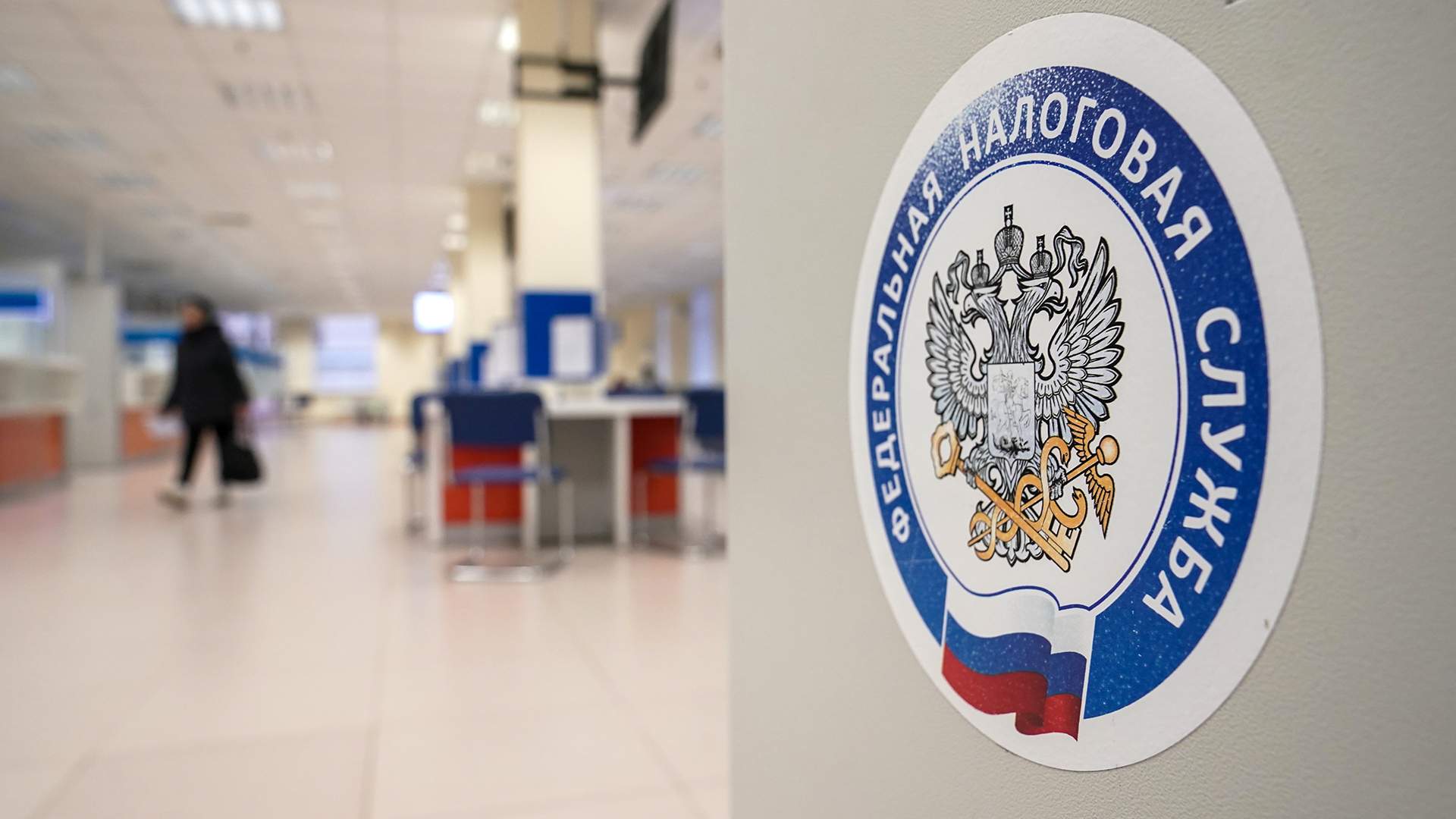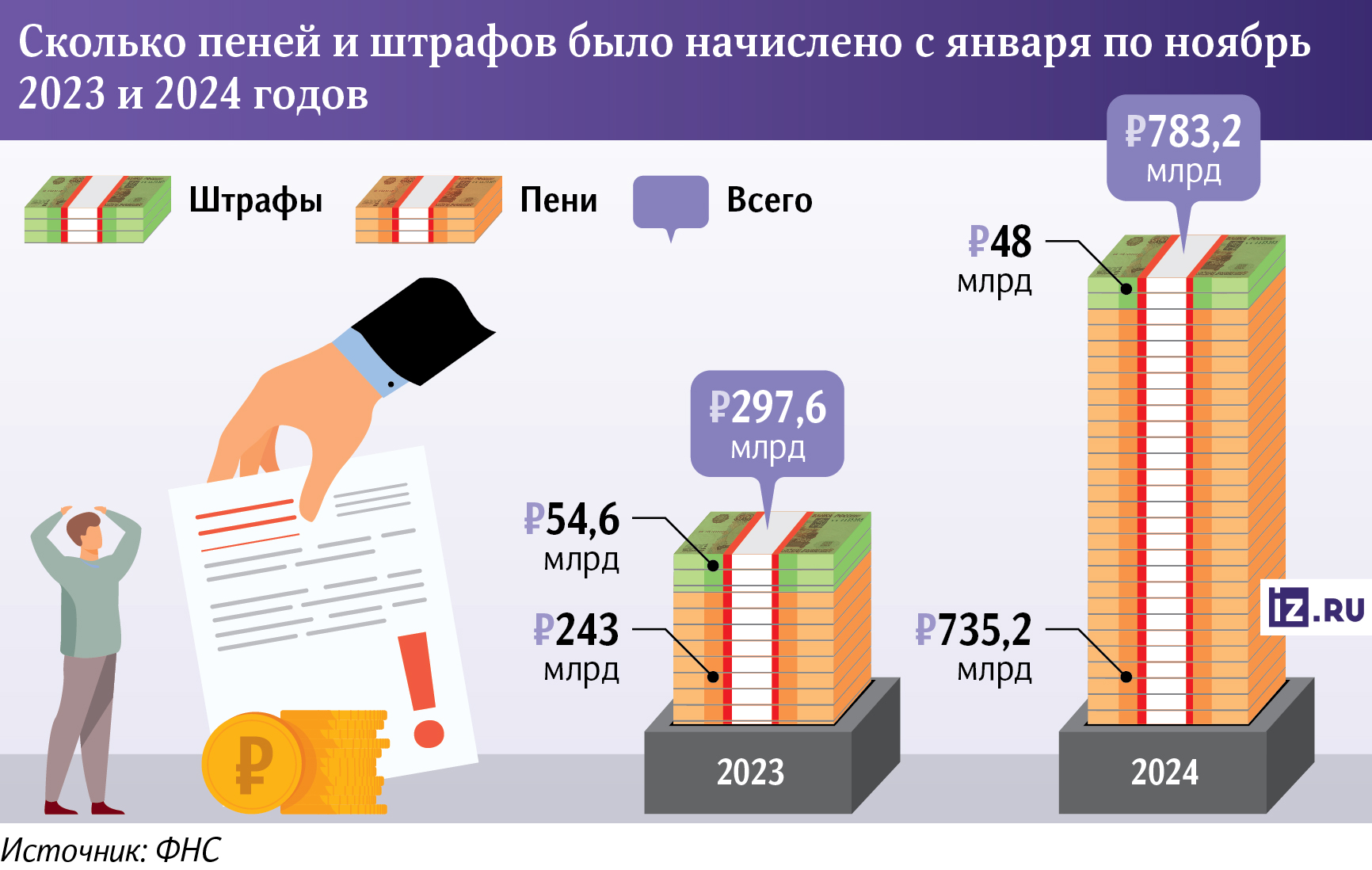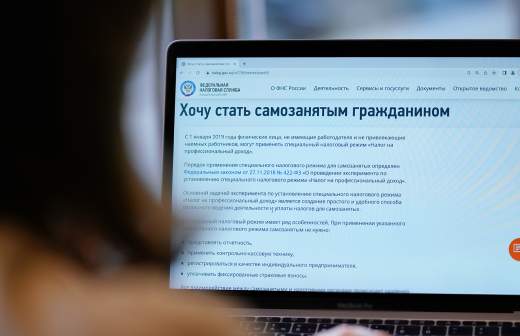Giving penalties: FTS accrues 2.5 times more penalties and fines in 2024

The tax authorities charged citizens and businesses two and a half times more penalties and fines for 10 months of this year than for the same period in 2023 - Br783 billion. This is a historical record. The reasons are the strengthening of control, as well as the increase in the key rate, on which the amount of sanctions depends. These are the results of the government's campaign to whitewash business: more efficient and selective inspections make it possible to find violators, including crushing schemes - like those of bloggers. With what fees are most often associated with violations and how penalties for penalties - in the material "Izvestia".
Why the volume of tax penalties is growing
By November 2024, the volume of penalties for tax violations amounted to 783 billion rubles - a record amount for at least 10 years (the Federal Tax Service does not provide earlier data). The amount for ten months is two and a half times higher than the figure for the same period in 2023 (297 billion), according to the statistics of the tax service ("Izvestia" has studied it).
According to the Federal Tax Service, most of the accrued amount was due to penalties (they are accrued regularly - for example, for each day of delay) - 735 billion this year (against 243 billion last year). Almost all the rest are fines.
This year, the period when tax penalties were calculated on the basis of 1/300 of the key rate per day, regardless of the duration of late payments, explained Evgeny Pantaziy, a lawyer at Leges Bureau, a member of the Russian Bar Association (RBA). He added: in 2024 already from 31 days of delayed payments the amount of the penalty will be determined at the rate of 1/150. Accordingly, this has increased the volume of additional charges, the expert noted.
- The price of tax mistakes is becoming more and more serious, and control over the implementation of legislation is improving and tightening, - said Evgeny Pantaziy.
At the same time, the key rate has also increased, said Natalia Milchakova, a leading analyst at Freedom Finance Global. From January to October 2024, it rose from 16% to 21% per annum, so the amount of accrued penalties for this period has also increased, she explained.
Another reason is the introduction of a single tax account, the expert emphasized. She recalled: earlier the Federal Tax Service reported that this year almost 60% of the accrued penalties were related to the failure of taxpayers to submit declarations on time. With the help of new technologies it has become easier for the service to control fees and identify who did not bring the necessary documents to their personal office on time, said Natalia Milchakova.
Delays in payment of taxes due to difficulties in repatriation of foreign currency earnings of exporters have also aggravated, emphasized Yaroslav Kabakov, Strategy Director of Finam Investment Company. According to him, problems with repatriations to Russian bank accounts may lead to delays in payments to the budget, increasing the accrued penalties.
In October 2023, Russian President Vladimir Putin signed a decree on the mandatory sale of foreign currency earnings. This is necessary to stabilize the ruble exchange rate. The largest exporters are obliged to return 40% of currency to the country and sell 90% of this amount. Initially, the threshold was higher - companies had to transfer 80% of income in foreign money to the Russian Federation.
At the same time, the work of the Federal Tax Service has become more selective, emphasized Ekaterina Golubtsova, Associate Professor of the Department of State and Municipal Finance at Plekhanov Russian Economic University. The service has increased its efficiency by improving big data analysis and risk-oriented approach, she said. Collections have also increased as a result of joint control measures with Rosfinmonitoring, Yevgeny Pantaziy of the UBA added.
One of the priority areas of work of the Federal Tax Service is control over bloggers' deductions. Last year several of them were prosecuted for non-payment of taxes.
For example, the amount of claims of the Federal Tax Service to Elena Blinovskaya amounted to 1.4 billion rubles, of which only penalties and fines - about 230 million. In addition, debts were found at Valeria and Artem Chekalin - in the amount of 500 million, including sanctions, they were repaid. Alexandra Mitroshina also paid a large underpayment (for 127 million).
The Ministry of Finance recommended Izvestia to ask the Federal Tax Service to explain the increase in the amount of accrued penalties and fines. The editorial board sent an inquiry to the tax service.
What tax violations are committed most often
As listed by Evgeny Pantazii from the UBA, the following tax violations are most often committed in the Russian Federation:
- failure to comply with the deadline for providing information on bank accounts;
- failure to submit a declaration;
- incorrect accounting of income and expenses;
- non-payment of fees;
- failure to notify the Federal Tax Service of transactions in a timely manner;
- submission of unreliable information.
In particular, a business understates the base for value added tax and profit tax, said Larisa Sorokina, Head of the Department of Accounting and Audit, Faculty of Economics, PFUR. In these cases, a fine of 20% of the amount of non-payment is levied. It can be increased up to 25% if a gross violation of accounting rules is detected, she added.
The amount of sanctions depends on the violation, continued Evgeny Pantaziy. According to him, the amount of the fine can be fixed or depend on the percentage. For example, for failure to pay a levy to the budget on transactions with controlled persons (between interdependent people and companies), 40% of the amount not remitted may be levied.
The increase in the volume of tax fines and penalties is the result of the government's campaign to whitewash business and increase tax collection in the budget. Back in October last year, the head of the Ministry of Finance Anton Siluanov said that the Federal Tax Service "was given an additional task to mobilize taxes, primarily indirect taxes". The Minister noted that the agency expects a 500 billion dollar increase due to increased collection of payments to the treasury.

The growth of accrued penalties and fines strengthens the budget system, believes Yaroslav Kabakov from Finam. This is especially important in the conditions of increasing deficit and external restrictions, as such revenues compensate for the oil and gas shortfall, he added. However, according to the expert, excessive pressure on business may provoke the growth of corporate bankruptcies, which in the long run may reduce the revenues to the treasury.
Meanwhile, according to Ekaterina Golubtsova from Plekhanov Russian Economic University, the Federal Tax Service's control measures increase tax discipline of business, which is a good support for the treasury in conditions of growing corporate profits.
Переведено сервисом «Яндекс Переводчик»







